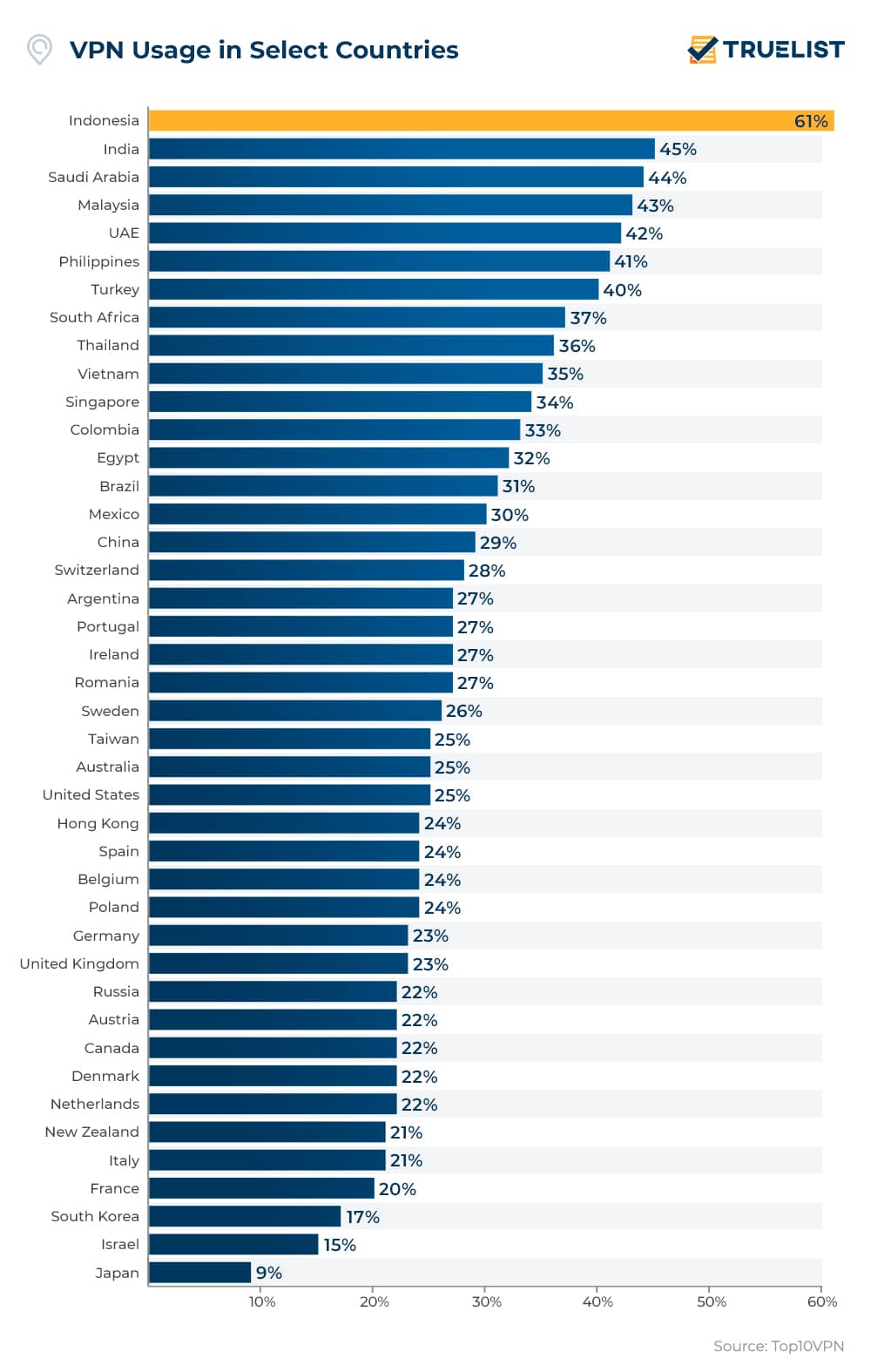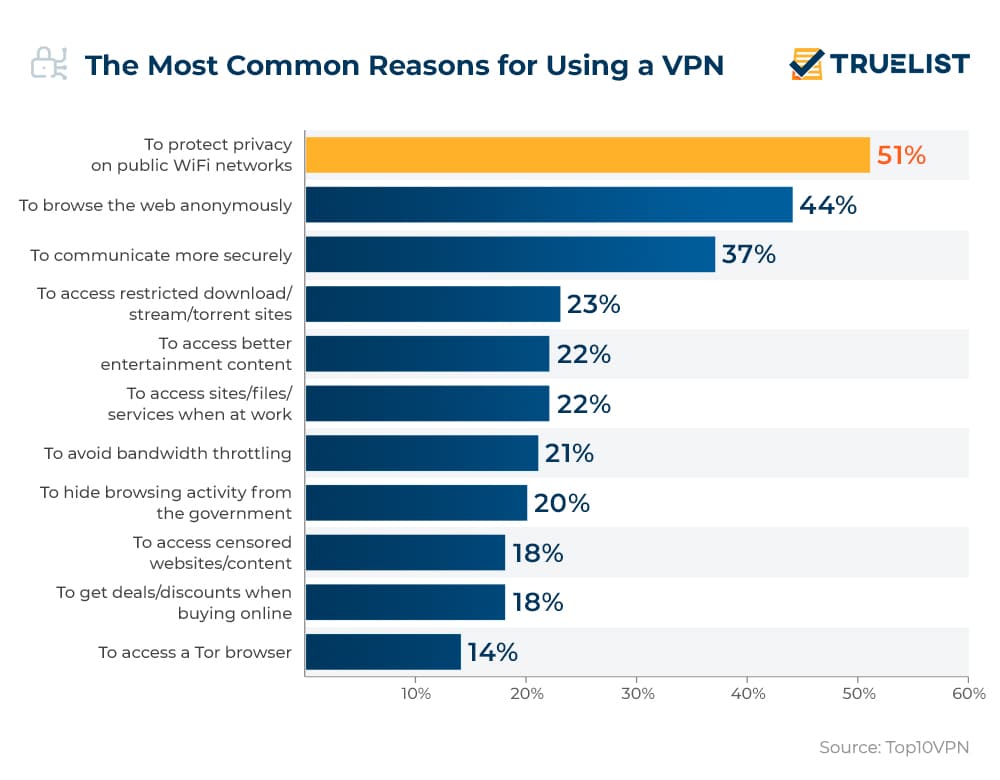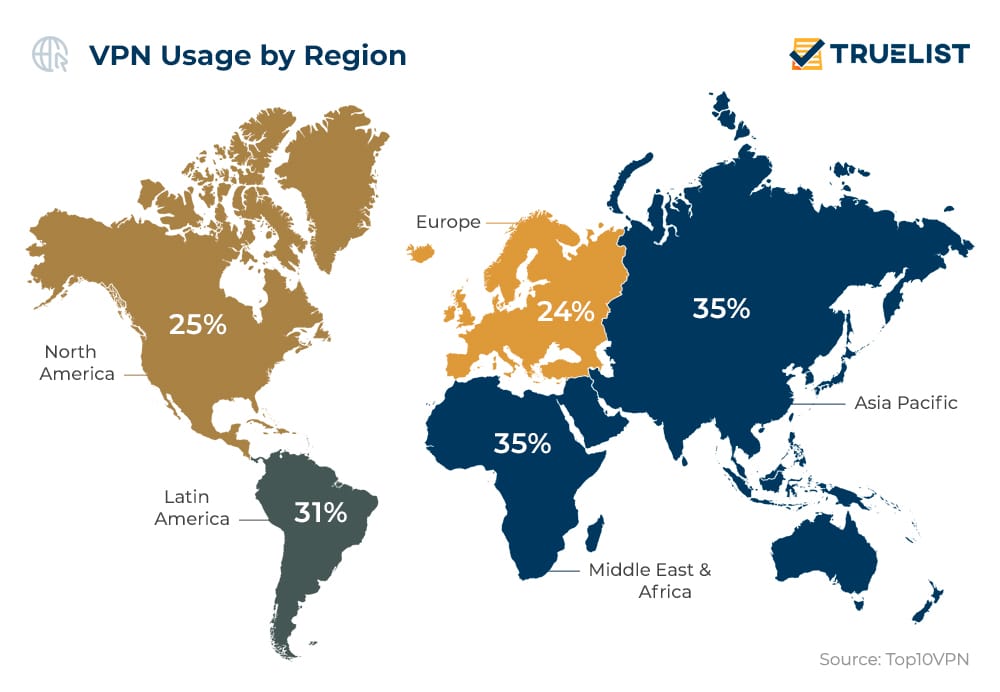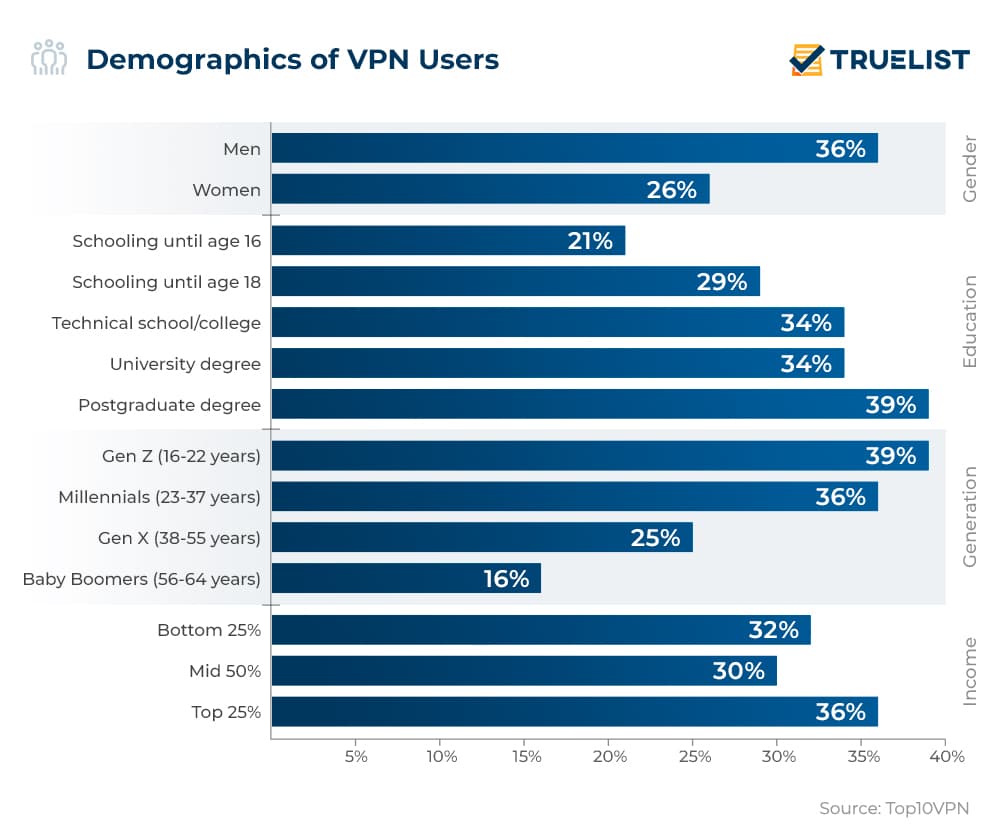Living in this day and age means constantly being online and sharing and accessing information from our phones or computers, both for work and fun. Doing so without a VPN (a virtual private network) often makes us easy prey for hackers. That’s why we’ll take a look at some of the most astonishing VPN statistics together to get a better insight into this technology and its many uses.
VPN Statistics (Editor’s Choice)
- 51% of people use VPN to protect their privacy on public WiFi networks. (Top10VPN)
- 31% of internet users worldwide use a VPN. (VPN Mentor)
- Almost 50% of US companies have suffered a data breach. (CompariTech)
- VPN data usage shows that 64% of VPN users use the technology on their smartphones. (CompariTech)
- 37% of businesses say that they would be ready for a cyber attack. (VPN Mentor)
- 72% of global security breaches involve large enterprises and 28% small businesses. (Finances Online)
General VPN Facts & Stats
1. 31% of internet users worldwide use a VPN.
Nearly a third of worldwide internet users already use a VPN. Though moving at a slow pace, the number of VPN users is actually increasing. The global VPN user base grew by a mere 3% percent in two years. Meanwhile, if we put that into numbers, we get around 1.48 billion VPN users.
(Top10VPN, DataReportal)
2. The global VPN market is predicted to exceed $107.6 billion by 2027.
Market experts predict that the VPN market, which was worth an estimated $35.4 billion in 2020, will see an annual growth rate of 17.2% over the next six years. That means the VPN market size in 2027 will soar to $107.6 billion.
(Research and Markets)
3. Indonesia is the top global VPN market with 61% of users.
More than 60% of Indonesians already have a VPN, making them the top market. VPN usage statistics show that India takes second place with 45% of the VPN user base, while Saudi Arabia has 44%. The number of VPN users in China is decreasing, placing the country outside of the top 10 list with 29%.
(Top10VPN)

4. 51% of people use VPN to protect their privacy on public WiFi networks.
Statistics show that 44% of users turn to the technology to keep their anonymity while browsing online, and 37% for establishing more secure communication. Another 22% say that they use VPN for streaming better entertainment content, and 23% use VPN to access restricted websites. VPN trends further reveal 22% say they need a VPN to access sites while at work. 21%, meanwhile, want to avoid bandwidth throttling, and 20% hide their web browsing from their government.
(Top10VPN)

5. The Netherlands shows a 76% spike in VPN growth.
VPN statistics show that the VPN market saw the biggest growth in the Netherlands since 2017 — a 76% increase, to be exact. The runner-up is Australia, with 69% growth, leaving Japan’s 62% in third place.
(VPN Geeks)
6. Germany has less than 10% of VPN users.
While their neighbors took the lead, as evidenced by the previous stat, Germans don’t seem too crazy about VPNs. In fact, only 6% of them use VPNs regularly. Even though Germans also have access to some of the best VPN services in the world, it still doesn’t change their opinion much.
(G2)
7. 77% of people who use VPN on a weekly basis still buy their digital content.
Most people think that those who use VPN take advantage of the technology to pirate online content. VPN statistics, however, show that 77% of the VPN user base buys digital content on a weekly basis.
(VPN Geeks)
8. The VPN market saw a 27.1% jump in 2020 due to COVID-19.
While most industries were considerably affected by the pandemic, the VPN market seems to be flourishing with people stuck working from home. It experienced an all-time high in market share growth, amounting to 27.1% in 2020.
(GlobeNewswire)
VPN Usage Statistics
9. The Middle East, Africa, and the Asia Pacific have the highest concentration of VPN users at 35%.
The highest percentage of worldwide average VPN usage is 35% in the Asia Pacific, Middle East and Africa, followed by 31% of Latin American users. North America scores 25%, while Europe has 24%.
(Top10VPN)

10. 36% of men use a VPN.
VPN trends further show that more than a third of males use VPN, while only 26% of women use these services. On the other hand, 39% of 16-22-year-olds, or Gen Zs who account for roughly one-third of the global population, use VPNs. Next is the 23-37 age group, which has a 36% usage rate. The percentage drops down to 25% with people aged 38 to 55. Finally, 16% of the 56-64 age group use VPN.
(Top10VPN)

11. Nearly 40% of VPN users have a postgraduate degree.
According to the Global Web Index, 39% of postgraduates are likely to use a VPN, while 34% of users have a university degree. 34% went to a technical school or college, and 29% of users had some schooling until the age of 18. Finally, VPN usage statistics show that 21% of users only had schooling until the age of 16.
(Top10VPN)
12. 45% of US internet users are more concerned about their internet privacy now than before.
Due to increasing data breaches and security attacks, over 40% of US citizens say they are more concerned about their cybersecurity now than they were before. About 72% of Americans worry about someone stealing their personal or financial information. Additionally, 43% of people worldwide say that they feel they lack control over their personal information.
(G2)
13. 64% of people use VPN on their smartphones.
VPN statistics show that smartphones and desktops are in a close-run when it comes to VPN usage. While almost 65% of people use VPN on their mobile devices, 62% use them on desktop clients. Additionally, only 8% of users have a VPN installed on their routers.
(CompariTech)
14. 15% of Internet users didn’t know what VPN was in 2020.
Although fewer people didn’t know what VPN is compared to 2020 (when 28% didn’t), VPN popularity seems to be declining a bit after the peak of the global pandemic. For example, those users who knew what VPN is but decided not to use it decreased by 20% between 2020 and 2021.
(Security)
Cybercrime & VPN Security Facts
15. 49% of US companies have suffered a data breach.
A survey from 2020 showed that 49% of US companies that don’t use VPNs had experienced a data breach at some point. Luckily, this is a reduction compared to 2019, when 65% of surveyed executives said their business encountered a cybersecurity breach.
(CompariTech)
16. A hacking attack happens every 39 seconds.
On average, hacking attacks take place 2,244 times every day. VPN breach statistics show that a computer without a strong VPN could undergo an attack more than once a minute on a daily basis. It is also predicted that businesses will fall victim to ransomware attacks so commonly that it will become a routine.
(Siemens)
17. There has been a 54% increase in mobile malware threats since 2016.
Mobile malware variants have seen a 54% increase in the last five years. These threats often result in identity theft, breach of confidentiality, and detrimental data breaches – all of which are serious problems individuals often face. VPN security facts point to this as one of the reasons for the technology’s growing popularity.
(VPN Compass)
18. 31% of households with more than five devices report security breaches.
Almost a third of households with 5+ devices, including desktops, laptops, smartphones, tablets, wearable devices, or TV-connected devices, have reported security breaches, as VPN breach statistics show. The percentage of breaches for non-VPN households with four devices is 25%, decreasing to 19% for households with three devices, 14% for 2-device-households, and 9% for those with just one device. Surprisingly enough, households with 0 of the devices mentioned above accounted for 6% of security breaches.
(VPN Mentor)
19. 37% of businesses think that they would be ready for a cyberattack.
A recent study has shown that 37% of businesses think they would be ready for a cyberattack, while 31% said exactly the opposite. 19% said they weren’t sure if they would be prepared, with the remaining 12% reporting they were working on it, according to VPN facts.
(VPN Mentor)
20. The cost of a successful cyberattack is over $5 million.
As previously mentioned, the costs of recovering from a cyber attack can be devastating for businesses, but you’ll be surprised to hear that a well-performed cyberattack costs at least around $5 million. We say at least because $5 million is just a fragment of the damage it could do to a well-to-do brand.
(VPN Compass)
21. 72% of breaches involve large enterprises.
Finally, according to VPN breach statistics, 72% of cybersecurity breaches happen to large businesses, while the remaining 28% involve small businesses. While it might seem small businesses are at less risk, you should consider that there are more of them – 60,000 new small businesses are opened every year. Additionally, 30% of global security breaches are perpetrated by company insiders.
(Finances Online)
VPN FAQs
How many people use VPN?
41% of US adults use a paid or free VPN for business or personal use.
(Security)
Why do people use VPNs?
VPN statistics show that people use the technology to access restricted geo-locked content and sites, social media, and news services. They also use VPN to keep their anonymity while browsing online, access sites while at work, or hide their web browsing from their government.
(Avast)
Who uses VPN?
VPN is mostly popular with younger generations, the 16-22 age group to be exact. Also, the majority of VPN users are male (62%), and 56% of all VPN users use it to access Netflix each month.
(Top10VPN, Statista)
Which country uses VPN the most?
Indonesia is the leading market with a 55% VPN user base.
(Security)
Is a VPN illegal?
Every country has different regulations about the legality of VPNs. While the use of VPNs is legal in most countries, it is banned in China, Belarus, Russia, North Korea, Iraq, and the United Arab Emirates.
(Security)
Conclusion
After going over some of the most riveting VPN statistics, it’s safe to say that we all understand the importance of virtual private networks. If not, let’s put it this way — there’s a 1 in 4 chance that you’ll be a victim of a cybercrime. On the other hand, your chances of getting struck by lightning are 1 in 14,600. That definitely puts things into perspective.
Sources: Top10VPN, VPN Mentor, CompariTech, CompariTech, Finances Online, DataReportal, Research and Markets, VPN Geeks, G2, GlobeNewswire, Security, Siemens, VPN Compass, Avast, Top10VPN, Statista, Security, Security

